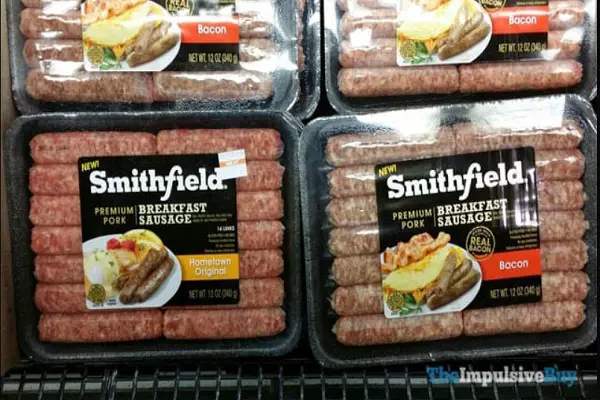
The top producer of pork in the United States, the Smithfield Corporation of Smithfield, Virginia, is well known for its line of sausages, roasts, ribs, bacon and more. These types of processed meats are favorites among United States customers, where they are widely consumed with Sunday breakfasts, at diners and breakfast spots across the country, and in other ways.
But what most people don’t realize is that Smithfield was purchased by WH Foods of China in 2013, a company that raked in $22.3 billion in revenue in 2017.
According to a February 2020 report in the Virginian-Pilot, Smithfield does not disclose how much meat it sends to China.
But the company has been in the news in recent years for selling about 38.8 million pounds of pork to the country during a short period of a few months. The world’s top consumer of the meat, China saw its pig population decline significantly in recent years due to African swine fever.
Meanwhile, China continues to buy large amounts of American pork — all while factory farming operations mercilessly pollute the landscapes of the American south.
In 2017, drone footage discovered horrifying environmental damage at the largest pork farming facility in the United States – Smithfield Foods, Inc. Secret recordings shot an eagle-eye view of what seems like a four-times football-stadium sized “lake” full of blood.
Upon further investigation, it was discovered that it was urine and feces from the company’s pigs.
Secretly recorded by Mark Devries, this footage is a part of his investigative documentary on factory farming called “Speciesism: The Movie.” According to the movie review, it is full of “troubling revelations” of society’s denial, ignorance and indifference towards the treatment of animals as well as our environment.
As shown in the secret footage, Smithfield seems unmoved by harsh criticisms of its practices.
The video shows a row of long buildings where pigs are jammed together, unable to even move. Their feces and urine is flushed into an outside “pool.”
But it’s not just the animals that suffer. People pay a price for this practice too.
“…The pit will fill up, so it has to be emptied. And it’s emptied by spraying the liquid waste…If you are familiar with a garden sprayer, they are gigantic versions of that. They are making droplets of fine mist out of this liquid waste and that can drift downwind into the neighboring communities,” explains Dr. Steve Wing of University of North Carolina.
People living around the farm have to tolerate the horrible smell from the factory. It doesn’t just make people gag, it also carries health repercussions.
“There are a number of studies of asthma and asthma symptoms particularly in children near these facilities. Among adults there are reports of several types of upper respiratory symptoms. These pollutants are affecting blood pressure,” Dr. Wing said.
Communities around these factory farms are usually low-income families, who do not have the money or the resources to fight against a big corporation. They have to live inside, without fresh air, with doors and windows shut. Sometimes it sounds like it’s raining, but it is the factory sprayer.
“Children are being made sick…animals are being abused, and everyday people’s lives are ruined by the stench of cesspools in their backyards. Thousands of lakes of toxic waste must be among the most bizarre and disturbing environmental phenomena that I have ever confronted and they’ve been kept well hidden from the public for long enough,” said Speciesism: The Movie director Mark Devries.
Smithfield Foods’s response to the footage was brief and emotionless.
The company said all of the practices were done following regulation; all the permits are available to public; and that the farm appeared “clean and well maintained.”